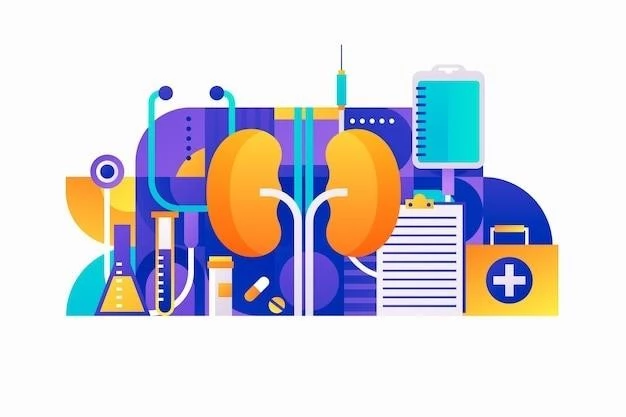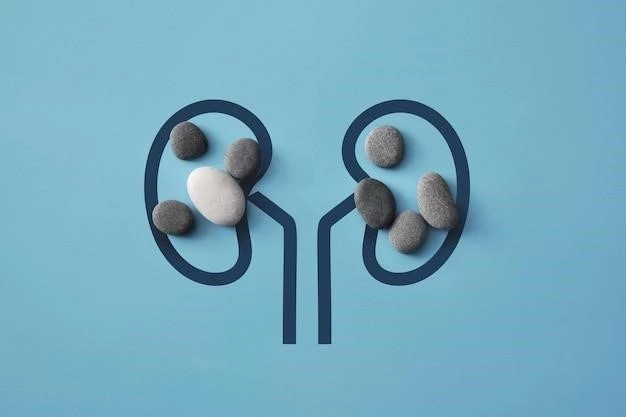Chronic Renal Failure⁚ An Overview
Chronic Renal Failure can be caused by conditions like diabetes, high blood pressure, and glomerulonephritis. Symptoms may include fatigue, swelling, and changes in urination. Treatment options range from medication to dialysis and transplantation.
Causes of Chronic Renal Failure
Chronic Renal Failure can arise from various factors, with the most common being⁚
- Diabetes⁚ Uncontrolled blood sugar levels can damage the kidneys over time.
- High Blood Pressure⁚ Hypertension can strain the blood vessels in the kidneys, leading to kidney damage.
- Glomerulonephritis⁚ Inflammation of the kidney filters can impair kidney function.
- Polycystic Kidney Disease⁚ Inherited disorder where cysts form in the kidneys, impacting their function.
- Autoimmune Conditions⁚ Diseases like lupus and others can cause kidney damage.
- Obstructive Conditions⁚ Conditions like kidney stones or tumors can obstruct urine flow, damaging the kidneys.
- Recurrent Kidney Infections⁚ Frequent infections can lead to scarring and chronic kidney issues.
Understanding these causes can help in preventing and managing Chronic Renal Failure.
Symptoms of Chronic Renal Failure
Recognizing the symptoms of Chronic Renal Failure is crucial for early detection and proper management. Common symptoms include⁚
- Fatigue⁚ Feeling tired even after rest.
- Swelling⁚ Swelling in the hands, feet, or face due to fluid retention.
- Changes in Urination⁚ Decreased urine output, foamy or bloody urine, or frequent urination at night.
- Nausea and Vomiting⁚ Feeling nauseous and vomiting, especially in the mornings.
- Itching⁚ Persistent itching without any rash.
- Metallic Taste⁚ Unusual metallic taste in the mouth.
- Shortness of Breath⁚ Difficulty breathing or shortness of breath may occur.
- High Blood Pressure⁚ Hypertension can be both a cause and a symptom of Chronic Renal Failure.
If you experience any of these symptoms, especially if you have risk factors like diabetes or hypertension, consult a healthcare provider for evaluation and appropriate management.
Treatment Options for Chronic Renal Failure
Managing Chronic Renal Failure involves various treatment approaches tailored to individual needs. Here are some common treatment options⁚
- Medication⁚ Certain medications can help control symptoms, manage complications, and slow down kidney damage.
- Blood Pressure Management⁚ Controlling blood pressure is crucial to preserving kidney function.
- Dietary Changes⁚ A diet low in sodium, potassium, and phosphorus can ease the burden on your kidneys.
- Fluid Restriction⁚ Limiting fluid intake may be necessary to prevent fluid overload in the body.
- Exercise⁚ Regular physical activity can improve overall health and reduce the risk of complications.
- Kidney Transplant⁚ For end-stage kidney failure, a transplant may be considered if you are a suitable candidate.
- Dialysis⁚ Hemodialysis or peritoneal dialysis filters waste from the blood when the kidneys can no longer perform this function effectively.

It’s essential to work closely with your healthcare team to develop a comprehensive treatment plan that addresses your specific needs and aims to preserve your kidney function and overall well-being.
Chronic Renal Failure Prevention
Preventing Chronic Renal Failure involves adopting healthy habits and managing underlying conditions. Here are some key strategies to help prevent kidney damage⁚
- Control Blood Sugar⁚ If you have diabetes, managing your blood sugar levels can reduce the risk of kidney complications.
- Manage Blood Pressure⁚ Keeping blood pressure under control through medication, diet, and lifestyle changes can protect your kidneys.
- Stay Hydrated⁚ Drink an adequate amount of water to promote kidney function and prevent dehydration.
- Eat a Balanced Diet⁚ Maintain a diet rich in fruits, vegetables, whole grains, and lean proteins while limiting salt, sugar, and processed foods.
- Avoid Smoking⁚ Smoking damages blood vessels, including those in the kidneys, so quitting smoking is beneficial.
- Exercise Regularly⁚ Physical activity helps control weight, blood pressure, and overall health, reducing the risk of kidney disease.
- Limit Alcohol Consumption⁚ Excessive alcohol can strain the kidneys, so moderate your intake.
By incorporating these preventive measures into your daily routine and seeking regular medical check-ups, you can lower your risk of developing Chronic Renal Failure and maintain kidney health in the long run.
Lifestyle Changes for Chronic Renal Failure
Adopting healthy lifestyle habits is essential in managing Chronic Renal Failure and improving overall kidney function. Here are some recommended lifestyle changes⁚
- Regular Exercise⁚ Engage in physical activity like walking, swimming, or cycling to boost overall health and circulation.
- Quit Smoking⁚ Smoking can worsen kidney function and increase the risk of kidney disease complications.
- Manage Stress⁚ Stress can impact blood pressure and overall health, so practice relaxation techniques like yoga or meditation.
- Monitor Blood Pressure⁚ Regularly check and manage your blood pressure to prevent further kidney damage.
- Get Adequate Sleep⁚ Aim for 7-8 hours of quality sleep each night to support overall health and kidney function.
- Avoid NSAIDs⁚ Nonsteroidal anti-inflammatory drugs (NSAIDs) can be harmful to the kidneys, so consult your doctor for alternatives.
- Limit Alcohol⁚ Alcohol can strain the kidneys, so moderate consumption or avoid it completely for better kidney health.
By incorporating these lifestyle changes into your daily routine, you can support your kidney health, manage Chronic Renal Failure effectively, and improve your overall well-being.
Dialysis for Chronic Renal Failure
Dialysis is a critical treatment option for individuals with Chronic Renal Failure, especially in advanced stages when the kidneys can no longer function effectively. There are two main types of dialysis⁚
Hemodialysis⁚
In hemodialysis, blood is filtered outside the body through a dialysis machine to remove waste and excess fluid. This procedure is usually done at a dialysis center several times a week and requires vascular access to facilitate blood flow.
Peritoneal Dialysis⁚
In peritoneal dialysis, a special fluid is introduced into the abdominal cavity through a catheter. The peritoneum, a membrane inside the abdomen, filters waste and fluid, which is then drained out. This type of dialysis can often be done at home after proper training.
It’s crucial to adhere to the dialysis schedule recommended by your healthcare team, follow dietary restrictions, and maintain good hygiene to reduce the risk of complications such as infections. Dialysis helps manage symptoms, improve quality of life, and support overall health in Chronic Renal Failure patients.
Complications of Chronic Renal Failure
Chronic Renal Failure can lead to various complications that significantly impact a person’s health and quality of life. Some common complications include⁚
- Fluid Retention⁚ Kidneys may struggle to regulate fluid levels, leading to swelling in the body.
- Electrolyte Imbalance⁚ Imbalanced levels of electrolytes like potassium and sodium can affect heart and muscle function.
- Anemia⁚ Decreased production of red blood cells can cause fatigue and weakness.
- Bone Disease⁚ Weakened bones and increased risk of fractures due to mineral imbalances.
- Cardiovascular Disease⁚ Chronic Renal Failure is a risk factor for heart disease and stroke.
- High Blood Pressure⁚ Kidney dysfunction can lead to hypertension, which further impacts the kidneys.
- Nerve Damage⁚ Accumulation of waste products can affect nerve function.
- Mental Health Issues⁚ Depression and anxiety are common in individuals with Chronic Renal Failure.
It is essential for individuals with Chronic Renal Failure to work closely with healthcare providers to monitor and manage these complications. By following treatment plans, maintaining a healthy lifestyle, and attending regular check-ups, the impact of complications can be minimized, and quality of life can be improved.
Diet for Chronic Renal Failure
Adopting a kidney-friendly diet is crucial in managing Chronic Renal Failure and supporting overall kidney health. Here are some dietary guidelines to consider⁚
- Limit Sodium⁚ Reduce salt intake to help control blood pressure and fluid retention.
- Monitor Protein⁚ Adjust protein consumption based on kidney function to reduce strain on the kidneys.
- Control Phosphorus⁚ Limit phosphorus-rich foods like dairy, nuts, and processed foods to prevent bone and heart issues.
- Manage Potassium⁚ Limit high-potassium foods such as bananas, oranges, and potatoes to prevent heart complications.
- Stay Hydrated⁚ Drink an adequate amount of water unless advised otherwise by a healthcare provider.
- Avoid High Sugar Foods⁚ Reduce sugar intake to maintain healthy blood sugar levels.
- Eat Balanced Meals⁚ Include a variety of fruits, vegetables, whole grains, and lean proteins in your diet.
- Consult a Dietitian⁚ Work with a dietitian to create a personalized meal plan tailored to your kidney health needs.
Following a kidney-friendly diet in conjunction with other treatment options can help manage Chronic Renal Failure, prevent complications, and improve overall well-being. Regular monitoring and adjustments to your diet are essential in maintaining kidney function.
